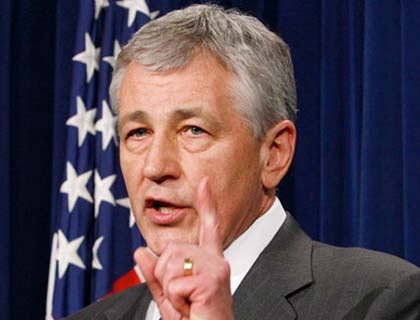WASHINGTON - The US Defense Secretary nominee, Chuck Hagel, on Wednesday said he agreed with President Barack Obama that an Afghan-led reconciliation process was the “surest way” to end violence in Afghanistan.
“I agree an Afghan-led reconciliation is the surest way to end violence and ensure lasting stability in Afghanistan and the region. Most counterinsurgencies end in some form of negotiation,” Hagel told the Senate Armed Services Committee in a written submission of answers ahead of his confirmation hearing on Thursday.
“The US role should be to facilitate credible negotiations between the Afghan government and the Taliban, and ensure that three necessary outcomes are met: "that the Taliban and (other) armed groups end violence, break ties with A Qaeda, and accept Afghanistan's constitution, including protections for all Afghan men and women,” said the two–time former Senator from Nebraska, who's answers to the Senate committee run into 112-page questionnaire.
The US should continue to coordinate efforts closely with the Afghan government, stressed Hagel who has been nominated by Barack Obama as his next defense secretary. If confirmed by the Senate, Hegel would replace Leon Panetta.
“Afghanistan's neighbors should support an Afghan-led process. Each will benefit from improved stability in Afghanistan or potentially suffer from continued violence. Pakistan and other neighbors should work forthrightly with Afghanistan to mitigate any suspicions or misunderstandings,” the 66-year-old said.
Responding to a question, Hagel said insider attacks had the potential to damage the strategic trust necessary for the US campaign to succeed. “It is vital that we work with our Afghan and international partners to take every step possible to stop these attacks. I understand that US and Afghan efforts have reduced attacks and are helping to reduce risks to coalition personnel. If confirmed, I will continue to pay close attention to countering this threat,” he said.
Hagel asserted the US would need immunity before it could commit its troops to Afghanistan post-2014. “I agree with the position made clear by the President (Obama) during his joint press conference with President Karzai on January 11 that "it would not be possible for us to have any kind of US troop presence (in Afghanistan) post-2014 without assurances that our men and women who are operating there are (not) in some way subject to the jurisdiction of another country," said the defense secretary nominee.
He said he believed the Afghan forces had and continued to make significant progress over the past few years. “I understand that today the ANSF field three out of every four people in uniform defending Afghanistan, and that Afghans conduct the majority of operations backed by the International Security Assistance Force (ISAF),” he said.
"We will define our post-2014 presence in Afghanistan and create a new relationship and partnership with Afghanistan. To counter terrorism, we will look into how we use our special operations forces and the development of new technologies and surveillance techniques," he said.
On Iran's nuclear program, Hagel observed it posed "a significant threat" to the US and its allies, saying "window is closing" on Tehran of diplomacy if it continues to flout world demands to end pursuit of atomic weapons.
Hagel supported Obama's policy that no option should be out of the table when it comes to addressing the threat posed by Iran.
He also said the threat posed by Al Qaeda to the US had diminished over the past four years, but expressed concern over the presence of the remaining leadership of the terrorist outfit in Pakistan and in Arabian Peninsula.
"... At the same time, Al Qaeda's remaining leadership in Pakistan and in the Arabian Peninsula remains of serious concern," Hagel said in the written set of answers.
Additionally, he said the Arab Spring had created new opportunities for Al Qaeda affiliates in Syria and North Africa. (Pajhwok)

